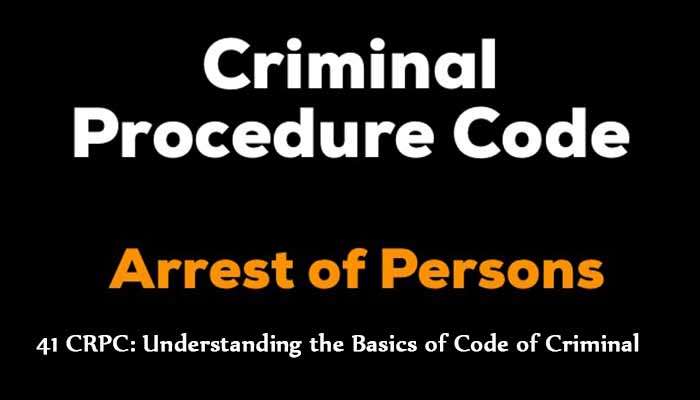
41 CRPC: Understanding the Basics of Code of Criminal
Introduction
Have you ever wondered how law enforcement agencies handle the process of arresting individuals? What guidelines do they follow, and under what circumstances can they take someone into custody? In India, Section 41 of the Code of Criminal Procedure (41 CRPC) plays a crucial role in regulating the arrest and detention of individuals. In this article, we’ll explore the key aspects of Section 41 CrPC, shedding light on its significance and implications.
Main Content
The Purpose behind Section 41 CrPC
Section 41 of the Code of Criminal Procedure aims to strike a balance between individual liberty and the authority given to law enforcement agencies to maintain order and ensure justice. It provides guidelines for the arrest and detention of individuals, preventing arbitrary or unjust arrests. This section serves as a crucial safeguard to protect the rights of individuals against any abuse of power.
Arrest Without Warrant
Under Section 41 CrPC, a police officer has the power to arrest an individual without a warrant if certain conditions are met. Let’s take a closer look at these conditions:
1. Cognizable Offenses
Arrests without a warrant are generally made in cases involving cognizable offenses. The crimes for which the police can make an arrest without a warrant are known as recognized offenses. These offenses are usually more serious in nature and include crimes such as murder, rape, kidnapping, and theft. The police officer must have reasonable grounds to believe that the person has committed a cognizable offense.
2. Reasonable Apprehension of Absconding
Another condition that justifies an arrest without a warrant is if the police officer has reasonable apprehension that the accused may abscond, evade the law, or not appear before the court if left free. This provision ensures that individuals who pose a flight risk or may tamper with evidence can be taken into custody to ensure a fair trial.
Safeguards against Arbitrary Arrest
While Section 41 CrPC empowers police officers to make arrests without a warrant under certain circumstances, it also recognizes the importance of safeguarding the rights of individuals. To prevent arbitrary arrests and protect individual liberty, the law sets clear guidelines that must be followed:
1. Recording of Reasons
When making an arrest without a warrant, the police officer is required to record the grounds for the arrest. This documentation helps ensure accountability and transparency, allowing individuals to challenge the legality of their arrest if necessary.
2. Communication of Arrest
Upon making an arrest, the police officer must inform the arrestee of the grounds for the arrest and the nature of the offense. This communication ensures that the individual is aware of the reasons for their arrest, promoting transparency and preventing confusion or abuse of power.
3. Time Limit for Production Before a Magistrate
Section 41 CrPC also includes a provision that specifies the time limit within which the arrested person must be produced before a magistrate. This helps prevent unnecessary or prolonged detention without presenting the individual before the appropriate legal authority.
Conclusion
Understanding Section 41 of the Code of Criminal Procedure is essential for anyone interested in the legal system and individual rights in India. This section strikes a delicate balance, granting law enforcement agencies the authority to make arrests without a warrant under specific circumstances while ensuring the protection of individual liberties. By adhering to the guidelines laid out in this section, authorities can uphold justice and maintain the trust of the public they serve.
Remember, the rule of law is a cornerstone of any democratic society, and appreciating the intricacies of legal provisions like Section 41 CrPC contributes to a fair and just society.
“The power to arrest comes with great responsibility, and it is essential to exercise it meticulously within the framework of the law.”
